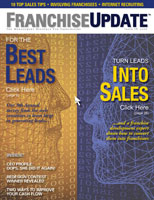Turning Internet Leads into Sales
Franchisors know the Internet is a valuable and necessary tool for generating leads. But for many, that's where the certainty ends - and the questions begin.
Is the money you're spending to purchase "real estate" on Internet portals worth it? What's your conversion rate of Internet leads? How does it compare with other sources? When a hot Internet lead arrives, how do you sort it out from the tire-kickers? And what do you do next to maximize the likelihood of moving that prospect to the next step?
This is only the beginning of questions that have franchisors scratching their heads, even as they continue to pour money into Internet advertising and marketing. After all, with something like 95 percent of prospects beginning their research online, how can you not?
In early October, Keith Gerson, vice president, marketing and development at AlphaGraphics, posed another question - a challenge, perhaps - to a roomful of attendees at Franchise Update Media Group's 8th Annual Franchise Development & Leadership Conference in Atlanta: How would you like to boost your conversion rate for Internet leads from one or two percent up to five percent?
According to Gerson, that is entirely possible. "We have been successful over time in moving the conversion rate of Internet referrals to sales as high as five percent," he says. "When we started out, Internet conversions were one of our lowest percentage of conversions."
Gerson led a conference session focusing on what he called "high tech/high touch methods" for franchisors to achieve the following:
- increase the number of Internet leads they receive;
- increase the number of Internet leads they convert; and
- increase their ROI from Internet marketing programs.
Succeeding in generating quality leads and managing them effectively requires a blend of traditional sales skills (high touch) and a working knowledge of the Internet and the people who use it (high tech).
"The Internet buyer is a different breed of cat," says Gerson. And, like cats, they require different types of care and feeding. Some have been "hunting" up to a year or more before contacting a franchisor; some click through after only a few minutes, eager to pounce. But in the main, today's prospects arrive better educated - not only about your concept, but about the competition, franchising in general, and the market forces at work in your industry.
But before diving into the high-tech side, it's important to keep the big picture in mind. First, says Gerson, remember that the Internet is just one part (though an ever-growing one) of an integrated sales and marketing strategy - and that there is no technological panacea for converting leads into sales. The franchisors most successful at doing this, he says, use a blend of the following:
- Internet marketing tools;
- technology tools;
- timely follow-up; and
- old-fashioned human contact.
"It's still sales and marketing," says Gerson. On the high-tech side, he says, "It's really a mix of utilizing these technologies to improve your efficiency and effectiveness. But it doesn't relieve you from the responsibility to touch as many of these prospects as you can by phone, face to face, through webinars, or some other means of interaction."
Second, know what you're talking about. Familiarize yourself with the basic terminology of Internet marketing and turn mystery into mastery. "It's not scary. Technologies exist that are very cost-effective," says Gerson. "A lot of this is really about common sense, and getting a little experience under your belt."
Measuring up
As franchisors allocate an increasing percentage of their marketing spend on Internet-based lead generation, says Gerson, "ROI has to be the biggest concern. But how do you measure it?" And while the Internet can seem a daunting, dazzling puzzle, it's not only manageable, but measurable, says Gerson, who takes his metrics seriously.
In a previous interview with Franchise Update, Gerson said, "I can't think of anything we're doing that can't be effectively measured and tracked. What is measured improves, and what is measured and put in writing improves exponentially." And, he added, "If it can't be measured, you're probably better off saving your money."
Today, he says, based on the metrics of his Internet spending at AlphaGraphics, "The ROI is justified." That is, if you know what you're doing. But if you don't, take heart, you're not alone.
In Atlanta, when 400 conference attendees were asked if they purchased keywords on search engines to recruit franchisees, 50 percent said yes, 20 percent said no, and 30 percent were considering it. But when those who said yes were next asked if they thought keywords were worth it, nearly six in 10 (57 percent) said they didn't know! (The remaining 43 were split evenly: 21 percent yes, 22 percent no.)
It's like herding cats
One strategy Gerson suggests for working with Internet candidates is that once a prospect contacts you, proceed at their pace, not yours - but automate the qualification process, rather than tie up your sales staff. "People have different needs at different moments throughout the information or sales cycle," he says. Online queries can come from someone 12 months out or 90 days out, which demands varying levels of response from the franchisor.
One way to manage this variability, says Gerson, is to use a company like Process Peak, a franchise sales and marketing company. Working with franchisors, the firm creates an online, virtual brochure that allows prospects to learn about a concept at their own pace. Brands with virtual brochures include Ben & Jerry's, Budget Blinds, Liberty Fitness, Puroclean, and Great Clips. (See www.process-peak.com/virtual_brochures.htm.)
Initial or welcome information about a brand is accessible to anyone, but a password is required to proceed further. This results in 1) the prospect needing to make contact with the franchisor's sales staff, 2) the franchisor being able to monitor the behavior of prospects as they move through the stages of discovery; and 3) the weaker prospects self-selecting their way out without consuming franchisor resources. AlphaGraphics is not currently using Process Peak, says Gerson, but he was exploring the possibility.
Automating lead management
Qualification is one big missing piece for franchisors in the conversion process; another is follow-up. Franchisors "need to improve the process of handling leads," says Gerson. Often, it's not so much a problem of generating leads, but of following up on them in a timely and effective way, he says. The challenge, he says, is how to qualify the online leads as intelligently and cost-effectively as possible so your sales personnel are not inundated with "suspects instead of prospects."
"A key culprit behind this waste of corporate assets is poor processes for handling leads and assessing their value," he says. Using automated processes and software filters, setting up your contact forms intelligently, and monitoring and measuring your performance can improve performance and boost your conversion rate.
At AlphaGraphics, Gerson uses a system from eMaximation that auto-generates an email response immediately upon receipt of an inquiry. A human response must follow quickly, he says, within four hours; sooner is better.
As part of the email program, the prospect is auto-enrolled to receive a total of 7 messages in 31 days. These pre-packaged emails include multi-media content and links to streaming video for prospects to view as part of a "drip feeding" strategy.
"What I mean by 'drip feed' is that I'm dripping out information, if you will, on a timely basis that leaves them wanting more," says Gerson. "It's basically reinforcing the brand, making sure that it's in front of somebody's eyes so they're not forgetting about us and potentially being lured by another opportunity"; or losing interest from lack of contact or inactivity.
"The system we use, Campaign Manager, allows you to go in and do a good job of predicting how real they are on the basis of whether or not they provided you with information, and how often they'll come back and look at the content, or even accept the first of the content messages," says Gerson. "If they haven't, it gives my franchise development directors the means to be able to resend the content, because often we'll miss something in our Outlook box and you don't necessarily go backwards."
There are many vendors offering similar services, says Gerson. He likes eMaximation because the firm is vertically focused in franchising.
Stand out from the crowd
One of the problems franchisors face on Internet sites, says Gerson, is the plethora of competitors in any given segment. This makes it difficult for shoppers to easily distinguish one brand from another - which is why, once a prospect does contact you, it's critical to differentiate yourself through the quality of your response.
"At that moment, the only way someone is able to break through is to do so on a timely basis," he says. "The one who picks up the phone and makes that connection is the one that will be the standard-bearer by which all others will be compared."
Prospects, says Gerson, will base their expectations of your subsequent behaviors on the quality of your initial response. They will assume that a franchisor demonstrating some form of superiority in its customer service will be similarly competent in its training, and can be counted on to provide the best and most timely support to its franchisees in the future.
At the conference, he told attendees of a study showing that airline passengers who saw a coffee cup ring on a fold-down tray were more likely to think that if the airline couldn't keep its trays clean, what was going on under the hood in terms of safety and maintenance? It's human nature to link one behavior with another, he says. Thus, when a franchisor responds in a prompt and effective way to an initial inquiry, the prospect is more likely to form a positive opinion from the start. In other words, first impressions matter - for better and for worse.
"There are so many more sales that could be made, so many more relationships that could be established, if we recognize that the moment of truth is that when somebody is dealing in e-time they're looking for a timely and an intelligent response to their inquiry," he says. AlphaGraphics, by the way, is a multiple number-one STAR Awards winner of Franchise Update Media Group's Mystery Shopper contest (see page 21 for this year's results).
Why less can be more
Many franchisors still focus on piling up as many leads as possible, measuring success in terms of quantity. This might be called a rookie mistake. The trick is to generate qualified leads and convert them into sales.
"People think this is a numbers game, and the more you put in the top, the more will come out the bottom. That's not necessarily true," says Gerson. "You can find yourself crippled in terms of your resources by burying people with tire-kickers and unqualified leads. It's better to have fewer leads that your people can do a better job of responding to and handling."
One solution: hire an outside company to pre-qualify your leads. During a recent campaign, Gerson hired Tm1, a local telemarketing firm that employs college students. "They're very articulate, do a great job, and have great technologies as far as their call center," he says. He paid Tm1 $500 for 1,000 calls to pre-qualify and determine levels of interest among independent printers." The qualified leads were turned over to his franchise development directors.
Keywords are the key
One of the ways to generate quality leads is through the underlying technology of your own web site. You can do this by working with search engine optimization experts to carefully choose the keywords and invisible "meta tags" (see glossary sidebar) used by search engines to index web sites and create search results pages. When this is done right, users typing in terms relevant to your concept will see your brand's name on the first page of their search results.
Paid solutions include buying ad space on franchise "portals" like bison.com or franchisegator.com. You can also bid to temporarily "own" keywords or keyphrases through Google AdWords, Yahoo's Search Marketing (formerly Overture), or MSN's Keywords. (For more information on how these work, see https://adwords.google.com/select/Login or http://searchmarketing.yahoo.com/rc/srch.)
The basic idea involves bidding for keywords that will propel your ads to the top (or side or bottom) of the first page a user sees. The cost per keyword varies based on several factors, including the popularity of the word (or phrase) and the competitive bidding to use it on a given day.
In his presentation, Gerson showed how choosing a popular, general term that costs more will generate more leads, but: 1) the cost per lead is higher, and 2) the leads are less qualified, causing potential overload for the sales department. He says to be thoughtful in terms of what words you want to own and dominate.
"When I was helping our franchisees with their search term optimization, I learned that some words were too ubiquitous and cost too much. Everybody clicks on them and nobody converts." But you will pay for those clicks anyway. "When you go on Overture, you can see how much, in terms of the auction sense, people bid to keep the positions they're in," he says.
The objective of bidding for keywords or phrases, he says, is to dramatically improve lead flow from user searches. "You have to choose relevant terms that fit the audience you're selecting. I could go ahead and purchase lifestyle terms like 'be your own boss,' but that is a commodity term of sorts, versus being very specific about 'opportunities' and 'visual communications,' or 'business-to-business franchise.'"
It's not necessary to be number one or two when you bid, which will cost more, but to be among the top three, he says. "I believe that it's okay as long as you can beat out number three, so you can take over that position. You can pick up a top three sponsorship of some powerful words for as little as a dime."
Under this scenario, it would cost you a dime each time someone clicked on your sponsored "pay per click" ad (not when the page appears on a user's screen). The click-through will take that person to a specific "landing page," which you can track, measure, and evaluate in terms of ROI.
The return on this kind of marketing investment, he says, is better than in any other form of advertising - and it's completely measurable, allowing a thorough analysis of your ROI. Also, says Gerson, you can protect your budget by limiting your bidding, for example, to $100 at 20 cents per term, and still put yourself in a top three position. "If I have $100 to devote against a specific keyword, I will maintain that position until either one of two things occurs: somebody outbids me, or my budget runs out."
What's the deal?
Keyword bidding is all part of the technical lowdown, but whether you want to generate more leads depends on your marketing goals at the time. "It's very situational," says Gerson. "The answer is known only by those who know whether or not they need more of a lead flow; whether or not their current advertising or marketing strategies are getting them the visibility and responses they need."
Says Gerson, "It's not a good thing to go out and generate more leads if you're not effectively handling them when you get them."
And, whether you do it yourself or use an outside service provider, you need to track your spending and measure your ROI. "Make a study on a monthly basis as to what words are working - how many leads did you generate at what cost?" advises Gerson. But, he adds, "Who cares about the number of leads? I would rather have fewer leads that account for higher closing effectiveness than the inverse. Some people lose sight of what the goal is."
One final note: After years of helping AlphaGraphics grow, Gerson is moving on. As of mid-November, you can find him as president and chief operating officer of PuroSystems, which provides commercial and residential property damage restoration and mitigation under two franchise brands, Puroclean and Purofirst.
Share this Feature
Recommended Reading:
FRANCHISE TOPICS
- Multi-Unit Franchising
- Get Started in Franchising
- Franchise Growth
- Franchise Operations
- Open New Units
- Franchise Leadership
- Franchise Marketing
- Technology
- Franchise Law
- Franchise Awards
- Franchise Rankings
- Franchise Trends
- Franchise Development
- Featured Franchise Stories
FEATURED IN

Franchise Update Magazine: Issue 4, 2006








 The franchise listed above are not related to or endorsed by Franchise Update or Franchise Update Media Group. We are not engaged in, supporting, or endorsing any specific franchise, business opportunity, company or individual. No statement in this site is to be construed as a recommendation. We encourage prospective franchise buyers to perform extensive due diligence when considering a franchise opportunity.
The franchise listed above are not related to or endorsed by Franchise Update or Franchise Update Media Group. We are not engaged in, supporting, or endorsing any specific franchise, business opportunity, company or individual. No statement in this site is to be construed as a recommendation. We encourage prospective franchise buyers to perform extensive due diligence when considering a franchise opportunity.